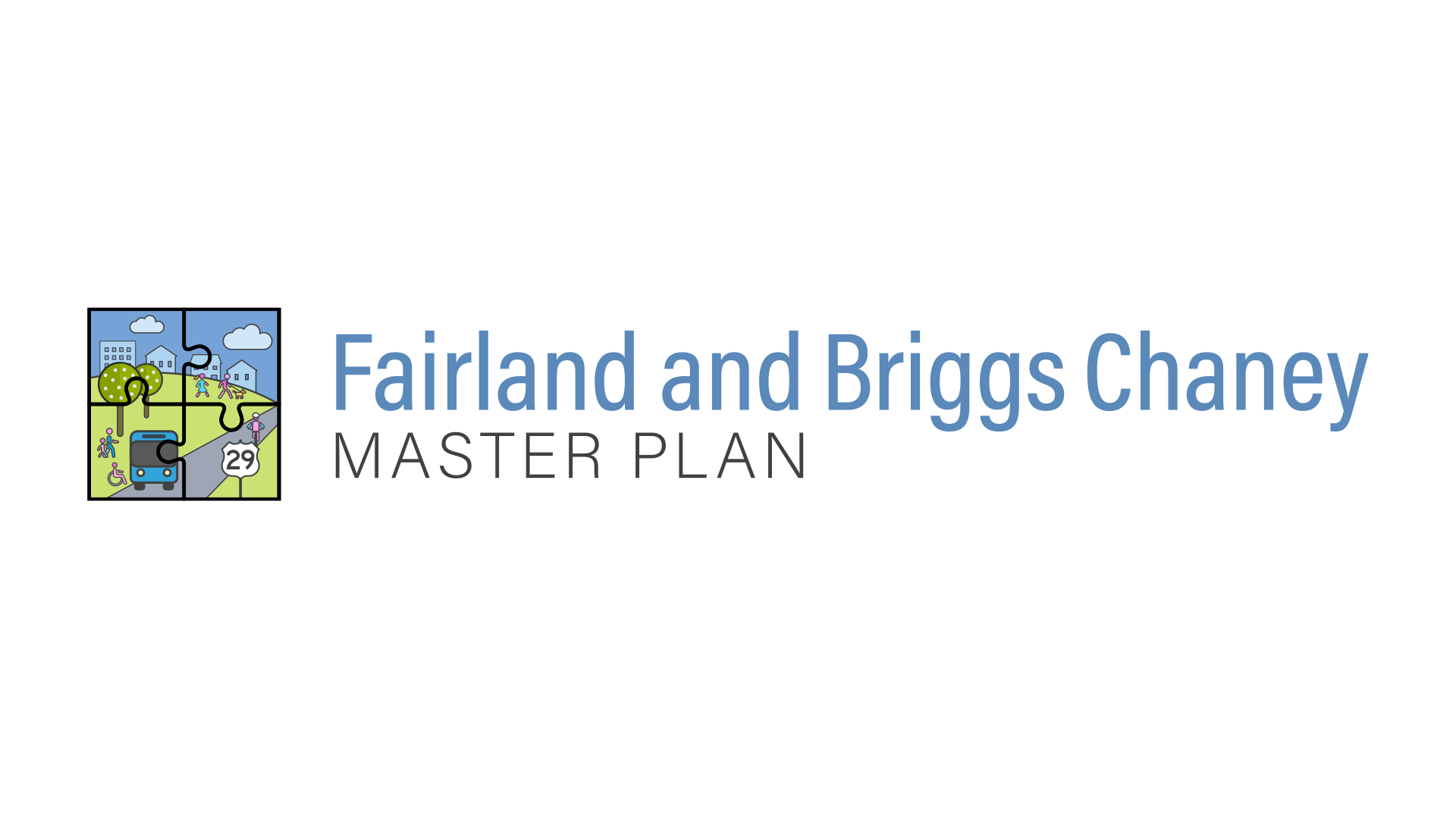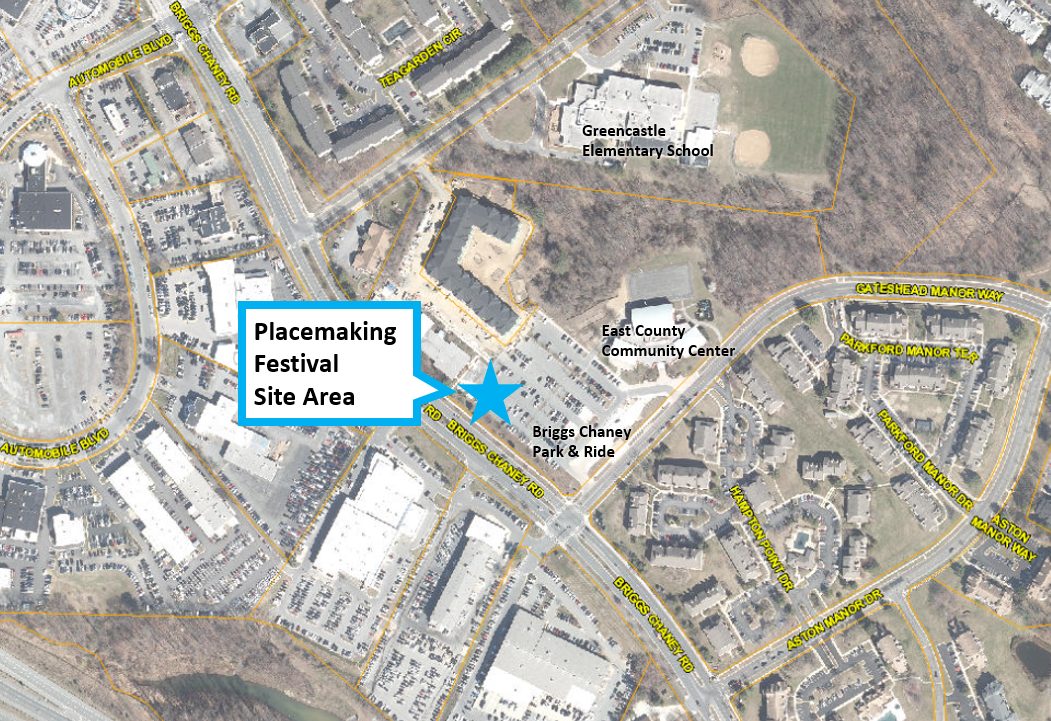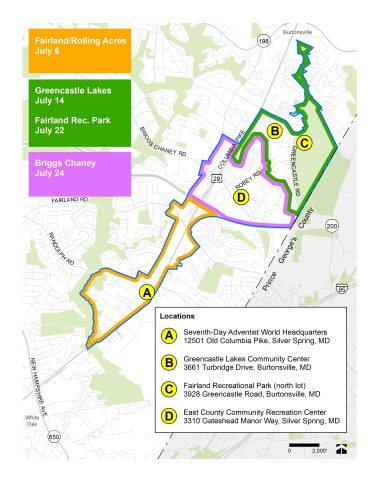
Community members are invited to take an online questionnaire in support of the fall placemaking festival, sign up as a festival volunteer, and attend a series of virtual and in-person Visioning Workshops about the future of the plan area
WHEATON, MD – The Montgomery County Planning Department, part of The Maryland-National Capital Park and Planning Commission (M-NCPPC), is hosting several opportunities for the community to get involved with the Fairland and Briggs Chaney Master Plan. These include efforts to support the Fairland and Briggs Chaney Placemaking Festival as well as the plan’s Visioning Phase, starting on June 27 and taking place through the summer.
The Fairland and Briggs Chaney Master Plan is an update to a portion of the 1997 Fairland Master Plan and will establish a clear vision for an equitable, just, and prosperous future for the Fairland community, mirroring the county’s long-term priorities, which include a vibrant economy, equity for all residents, and a healthy environment. The master plan boundary consists primarily of property and communities of Fairland and Briggs Chaney along the US 29 Corridor from near Paint Branch on the south to Greencastle Road on the north.
Fairland and Briggs Chaney Placemaking Festival
On June 1, Montgomery Planning staff held a virtual kickoff meeting for the Fairland and Briggs Chaney Placemaking Festival. During the kickoff event, Montgomery Planning launched the Fairland and Briggs Chaney Placemaking Festival effort. In addition, community members were invited to participate in this effort by providing their ideas and feedback on how to temporarily transform a small portion of the parking lot shared by the Montgomery County Services Center, Eastern Montgomery Regional Services Center, and the Briggs Chaney Park and Ride into a fun and inviting place for residents to visit. The placemaking festival will culminate with a free, community-led event scheduled for October 21 and October 22. If you were unable to attend the virtual kickoff meeting, you can access the kickoff meeting recording and presentation on the Fairland and Briggs Chaney Placemaking Festival webpage.

All community members are welcome to respond to the Montgomery Planning team’s questionnaire from now until June 20 to guide the festival’s program and design. Some potential temporary changes could include ground murals, greenery and landscaping, shade, seating, and opportunities for community gathering. Additionally, Montgomery Planning staff hope to test some ideas and get feedback that will be incorporated into the ongoing master planning efforts for the Fairland and Briggs Chaney communities and Montgomery County.
Take the Fairland and Briggs Chaney Placemaking Festival Questionnaire.
The Fairland and Briggs Chaney Placemaking Festival team also invites community members to volunteer to later help create the temporary public open space. Community members will work with the Better Block Foundation team through the summer and fall to build, paint, and construct their ideas and bring them to life. This transformed outdoor space will host food and retail vendors, Montgomery Parks’ activities and features, and a welcoming place for residents to gather with their family, neighbors, and friends during the October 2022 public celebration.
Sign up to volunteer to help create the temporary festival space this fall.
Fairland and Briggs Chaney Visioning Workshops
The community is invited to attend virtual and in-person events to share ideas for the future of the Fairland and Briggs Chaney plan area. This phase will kick off with a virtual Visioning Workshop on June 27.
Each Visioning Workshop will include a presentation of the equitable engagement efforts to date, followed by a discussion facilitated by Story Tapestries on the community’s vision. The feedback and ideas collected during the Visioning Workshops will inform Montgomery Planning’s preliminary recommendations for the master plan.
There are two virtual and four in-person Visioning Workshops scheduled. RSVPs are required unless otherwise stated. Please provide at least 10 business days’ notice for ADA or language translation assistance. Virtual sessions will be recorded and posted on the plan’s website.
Virtual Fairland and Briggs Chaney Visioning Workshops
Join Montgomery Planning via Zoom from 6 to 7:30 p.m. on June 27 and July 19 to discuss the master plan update and share your ideas and recommendations for the future of the Fairland and Briggs Chaney communities through a series of interactive activities.
In-Person Fairland and Briggs Chaney Visioning Workshops

The community is invited to share ideas and feedback in person on July 6, 14, 22, and 24 to help envision the future of the Fairland and Briggs Chaney communities. Each meeting will include a recap of community feedback heard at prior Visioning Workshops. While three of the in-person meetings will be facilitated by Story Tapestries through a series of engaging small group activities that focus on a specific part of the Fairland-Briggs Chaney Master Plan area, ideas for the entire area are welcome at every meeting. Additionally, community members are invited to share their ideas with the master plan team at a family-friendly community event on July 22 at Fairland Recreational Park.
Wednesday, July 6 – Meet at the Seventh Day Adventist Headquarters (12501 Old Columbia Pike, Silver Spring, MD) from 6 to 8 p.m. The conversation will focus on the southern portion of the master plan area.
Thursday, July 14 – Meet at the Greencastle Lakes Community Center (3661 Turbridge Drive, Burtonsville, MD) from 6 to 8 p.m. The conversation will focus on the northern portion of the master plan area.
Friday, July 22 – Meet Montgomery Parks and Planning staff and other community partners for this fun and engaging, family-friendly community event at the M-NCPPC Fairland Recreational Park (3928 Greencastle Road, Burtonsville, MD) in the north lot from 5 to 8 p.m. Food, music, and entertainment will be provided. Participants are encouraged to share ideas on the future of parks and recreation in the Fairland and Briggs Chaney communities, meet community partners from across the county, and grab some free treats. (No RSVP required, community members are invited to stop by between 5 and 8 p.m.)
Sunday, July 24 – Meet at the East County Community Recreation Center (3310 Gateshead Manor Way, Silver Spring, MD) from 2 to 4 p.m. for the last in-person Visioning Workshops with Story Tapestries. The conversation will focus on the central portion of the master plan area.
Community members who register for these events will receive a reminder 48 hours before the event with a request to let Montgomery Planning know if they can no longer attend.
Learn more about what to expect at the Visioning Workshops with the FAQs section of the plan’s webpage.
Additional ways to get involved
- Sign-up for the Fairland and Briggs Chaney E-Letter
- Review the Scope of Work report, Community Engagement report and the Existing Conditions
- Request a meeting and/or send your comments directly to the plan’s co-project managers: Molline.Jackson@montgomeryplanning.org and Clark.Larson@montgomeryplanning.org
Equitable approach to planning
Equity is a foundational goal of the Fairland and Briggs Chaney Master Plan, and racial equity and social justice is an essential theme throughout the planning process. Montgomery Planning is making every effort to understand the historical context and current experience of inequity within the plan area. Community engagement efforts are designed to meet people ‘where they are’ in the community and to provide welcoming, accessible, inclusive, and safe environments in which to learn about the master plan and offer meaningful input in the process. As a complement to the planning process Montgomery Planning is also striving to develop a stronger social network that embraces the advantages of a multi-racial and multi-cultural community.
About the Fairland and Briggs Chaney Master Plan
The Fairland and Briggs Chaney Master Plan is an update to a portion of the 1997 Fairland Master Plan and will establish a clear vision for an equitable, just, and prosperous future for the Fairland community, mirroring the county’s long-term priorities, which include a vibrant economy, equity for all residents, and a healthy environment. The master plan boundary consists primarily of property and communities of Fairland and Briggs Chaney along the US 29 Corridor from near Paint Branch on the south to Greencastle Road on the north. The update will examine and provide policies and recommendations on existing and future land uses and zoning, housing inventory and needs, transportation systems, historic preservation opportunities, area park facilities, and the environment. This master plan will take cues from the equity framework in the update to the county’s General Plan, Thrive Montgomery 2050, which describes how places with equitable access to opportunity produce strong, successful communities. Goals of the Fairland and Briggs Chaney Master Plan include:
- Complete Community: Identify and correct past inequitable development policies to make the Fairland and Briggs Chaney communities more whole and connected by integrating centers of housing, retail, and office development with parks and open space to make 15-minute living a reality for as many people as possible.
- Resilient Economy: Promote economic development and job growth within the plan area and surrounding communities.
- Housing: Promote racial and economic diversity and equity in housing to help rectify past discriminatory housing policies in every neighborhood.
- Arts, Culture and Environment: Support arts and cultural institutions, through parks, open space and environment, recreational programming, and development, to celebrate our diversity, strengthen pride of place, and make the county more attractive and interesting.
- Corridor Growth and Connectivity: Promote and prioritize public and private investment along the Route 29 corridor and neighboring communities to leverage and attract future private investment in community facilities and redevelopment, including a safer, more comfortable network for walking, biking, and rolling that connects the corridor communities.
About Montgomery Planning’s Equity Agenda for Planning
Montgomery Planning recognizes and acknowledges the role that our plans and policies have played in creating and perpetuating racial inequity in Montgomery County. We are committed to transforming the way we work as we seek to address, mitigate, and eliminate inequities from the past and develop planning solutions to create equitable communities in the future. While it will take time to fully develop a new methodology for equity in the planning process, we cannot delay applying an equity lens to our work. Efforts to date include:
- Developing an Equity Agenda for Planning. The Planning Board approved Equity in Master Planning Framework, and staff is working on action items.
- Prioritizing equity in Thrive Montgomery 2050. Community Equity is one of the three priority areas of our county General Plan update, Thrive Montgomery 2050.
- Focusing on equity in upcoming plans. Equity is a central focus of the Silver Spring Downtown and Adjacent Communities Plan, the first master plan to launch since Montgomery County’s Racial Equity & Social Justice Act passed. All upcoming plans and studies will have an equity focus.
- Created an Equity Focus Areas mapping tool and developing a Community Equity Index. Equity Focus Areas in Montgomery County have high concentrations of lower-income people of color, who may also speak English less than very well. Montgomery Planning developed this data-driven tool to identify and map these areas to assess potential racial and social inequities and produce master plans that will foster more equitable outcomes for communities in Montgomery County. The Community Equity Index will expand on the previous Equity Focus Area analysis, creating a more robust, diagnostic tool providing additional detail of critically selected neighborhood characteristics relevant for equity analysis countywide.
- Viewing management and operations through an equity lens. Our efforts are not limited to the master planning process. Management and operational functions like communications and human resources are developing approaches, tools, plans, and training to ensure that we look at everything through an equity lens.